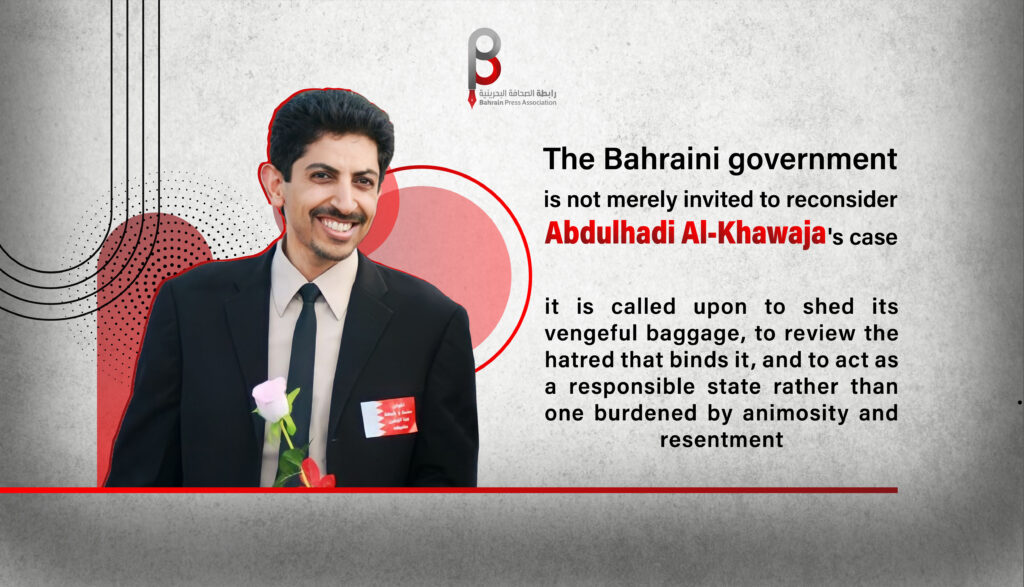When Will Bahrain Stop Its Hatred Towards Abdulhadi?

The Chronic Migraine of the Bahraini Government: Abdulhadi Al-Khawaja.
Wednesday, May 10, 2022
London, United Kingdom
London, United Kingdom: Since 2011, the Bahraini government has been plagued by a
chronic headache named Abdulhadi Al-Khawaja. Al-Khawaja’s prestigious international
reputation as one of the foremost human rights activists in the Gulf region, coupled with
his dual Bahraini and Danish citizenship, have afforded him significant political, human
rights, and media attention. Despite numerous international pleas and diplomatic
initiatives by the Danish government and European Union, Bahrain persists in keeping
Abdulhadi in prison.
The Bahraini government has implemented some measures, such as the Alternative Sentencing
Project and subsequently the Open Prisons Project, which garnered local and international
approval. However, contrary to expectations that these measures might provide Abdulhadi Al-
Khawaja with an opportunity for release, they did not. It is undeniable that a vengeful spirit still
dominates the minds of Bahraini authorities when it comes to Abdulhadi Al-Khawaja,
specifically.
Abdulhadi played a prominent role in the February 2011 protests, and is considered one of the
key field leaders. Following the declaration of a state of national safety (emergency) in March
2011, Bahraini authorities not only arrested Al-Khawaja and brought him to trial but also as
documented in the Bahrain Independent Commission of Inquiry’s “Bassiouni Report” Abdulhadi
has endured torture, including severe beatings, repeated assaults, and humiliation.
Subsequently, judicial authorities sentenced Al-Khawaja and his colleagues to life imprisonment
for their roles in the protests and their activism, resulting in the harshest penalty for any
political dissident or human rights activist. Major world powers, including the United States, the
European Union, and the United Nations, along with leading human rights organizations,
condemned Al-Khawaja’s imprisonment and called for his release. However, the Bahraini
government remained steadfast in its refusal to heed those demands. Al-Khawaja’s tenacious
hunger strike, which nearly cost him his life, caused significant embarrassment for the
government. From within prison, he succeeded in drawing the world’s attention back to
Bahrain and its human rights record, creating yet another fresh headaches for the government.
His hunger strike became a substantial topic for global media, which closely monitored his
health and pressured both the Bahraini and Danish governments to secure his release through
negotiation with Bahrain. While international interventions succeeded in mitigating the harsh
conditions and retaliatory stance against Al-Khawaja as he served a life sentence, they failed to
secure his freedom.
At that time, Denmark was on the verge of reaching a solution leading to Al-Khawaja’s release
and his exile abroad. However, for some reason, the Bahraini government changed its stance at
the last moment and clung to his arrest and punishment. The government gambled on the
passage of time, hoping it would diminish the momentum and lead to the case’s oblivion.
To this day, international human rights organizations remain faithful to Al-Khawaja,
commemorating his birthday, the anniversary of his arrest, and any Bahrain-related special
occasions. Through these campaigns, these organizations continually reopen the file of
Bahrain’s human rights situation, focusing on both old and recent violations, thus reigniting
media interest and prompting calls for meaningful reforms in Bahrain.
Just weeks ago, Bahrain hosted the International Parliamentary Union Conference, which,
instead of improving Bahrain’s image through organizing international events, became another
opportunity for Abdulhadi Al-Khawaja’s resurgence. Delegations from Denmark and Norway
demanded his release. A government-appointed Shura Council member, Jamal Fakhro,
attempted to defend Bahrain’s position but failed to persuade anyone. Media outlets circulated
videos of the Danish and Norwegian delegations, once again bringing Bahrain’s human rights
record to the forefront.
Thirteen years have passed since Al-Khawaja’s arrest, yet the international community and
human rights organizations have not forgotten him. They continue to remind the world of him
and his case, calling for an end to his arbitrary detention, a demand reiterated by the United
Nations Special Rapporteur on the situation of human rights defenders, Mary Lawlor, just a few
weeks ago.
The Bahraini Press Association emphasizes that the Bahraini government is not merely invited
to reconsider Abdulhadi Al-Khawaja’s case; it is called upon to shed its vengeful baggage, to
review the hatred that binds it, and to act as a responsible state rather than one burdened